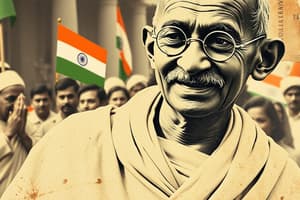Podcast
Questions and Answers
What profession was Gandhi trained to be?
What profession was Gandhi trained to be?
lawyer
What did the Indian National Congress tell citizens to do during World War II?
What did the Indian National Congress tell citizens to do during World War II?
refuse to vote in elections
In ___, the Indian National Congress adopted Gandhi's strategy to boycott British goods.
In ___, the Indian National Congress adopted Gandhi's strategy to boycott British goods.
1920
Why was the Salt March a turning point in India's struggle for independence?
Why was the Salt March a turning point in India's struggle for independence?
What does Gandhi's nickname, Mahatma, mean?
What does Gandhi's nickname, Mahatma, mean?
If the United States was to be partitioned in the same way India was, what would the partition be based on?
If the United States was to be partitioned in the same way India was, what would the partition be based on?
Who made the statement regarding the partitioning of India: 'Those who demand separation would, in the end, suffer most for it...'?
Who made the statement regarding the partitioning of India: 'Those who demand separation would, in the end, suffer most for it...'?
What was one of Jawaharlal Nehru's first duties as India's Prime Minister?
What was one of Jawaharlal Nehru's first duties as India's Prime Minister?
Flashcards are hidden until you start studying
Study Notes
Key Figures
- Mahatma Gandhi was trained as a lawyer, shaping his future role as a leader in the Indian independence movement.
- Jawaharlal Nehru, an important figure in India's fight for independence, made significant statements about the partition and its consequences.
Historical Context
- The Indian National Congress, during World War II, encouraged the populace to boycott elections as a form of protest against British rule.
- In 1920, the Indian National Congress officially adopted Gandhi's strategy to boycott British goods, marking a significant shift in their approach to undermine British authority.
Significant Events
- The Salt March became a pivotal moment in India's independence struggle, gaining international attention through the coverage of foreign journalists.
- The partition of India is outlined as being potentially based on religious groupings, mirroring the complex social landscape of the time.
Concepts and Terminology
- The term "Mahatma" translates to "great soul," reflecting Gandhi's revered status among his followers and the broader Indian public.
- Nehru's early responsibilities as the Prime Minister included initiatives aimed at improving living standards for all Indians, emphasizing the need for social reform in the post-colonial era.
Studying That Suits You
Use AI to generate personalized quizzes and flashcards to suit your learning preferences.




